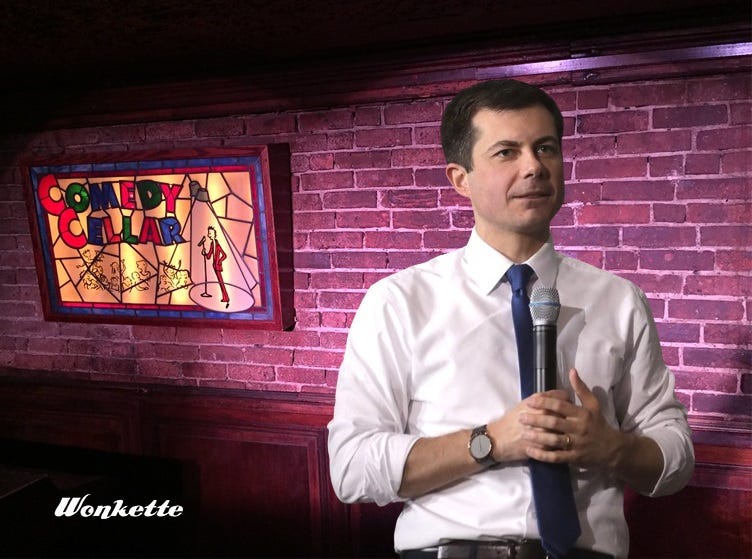The Biden administration’s ongoing war on “junk fees” and other general pains in the ass for consumers continued this week, with the Transportation Department filing final versions of two new rules aimed at making major airlines straighten up and fly right.
The first rule requires airlines to do one seemingly simple thing: Disclose the full price of tickets before people buy them. This price must include whatever dumbass made-up fees will apply, from fees to check luggage to fees for keeping the doors attached to the aircraft. The other rule will make airlines provide a full cash refund — not a voucher, not a coupon for discounted snow tires — when flights are cancelled or significantly altered. That’s some cancel culture we can get behind, thank you.
In a statement announcing the new rules, Transportation Secretary Pete Buttigieg said, “Passengers deserve to know upfront what costs they are facing and should get their money back when an airline owes them — without having to ask.”
Buttigieg added,
“Today’s announcements will require airlines to both provide passengers better information about costs before ticket purchase, and promptly provide cash refunds to passengers when they are owed — not only saving passengers time and money, but also preventing headaches.”
The Transportation Department points out that extra fees have been a growing source of revenue for airlines. Between 2018 and 2022, airlines’ revenue from baggage fees increased by 30 percent, more than double the growth in their revenue from operations overall. As time has gone on, fees have gotten more complex and confusing for passengers, which is why the department decided to step in.
The goal is to create a fair ground for competition, where passengers know what their real ticket price will be before they buy.
The extra service fees airlines will need to disclose will include fees for checking one or more bags, carrying a bag on the plane (really), and cancelling or changing a reservation, among others. In a bit of press release bragging, the DOT notes that the rule won’t require disclosure of fees for seating families together, because the agency is planning “a separate rule that bans airlines from charging these junk fees.” So there.
Airlines will be required to disclose all the hidden fees upfront, and to explain their policies upfront as well. Online, the fees must be displayed the first time ticket information is shown, not hidden behind a hyperlink. The fees and policies will also have to be shared with third parties like travel agencies and online ticket outlets, with updates whenever they change.
And no more bait-and-switch ads where airlines advertise a deeply discounted fare for some flights, but then tack on a bunch of fees that mean nobody actually pays that price. Don’t you hate when that happens?
The new rule on cancellation refunds is pretty simple: If the airline cancels your flight, you get your money back, and right away. This one is also about fair competition, since up until now airlines all set their own standards for what would trigger a refund or not. The DOT also got consumer complaints of some airlines “revising and applying less consumer-friendly refund policies during spikes in flight cancellations and changes.” And airlines wonder why people hate flying.
The new rules will require refunds whenever a flight is canceled or significantly changed, even if the consumer turns down alternative transportation or a travel credit. The rule even defines what a “significant change is,” for the first time:
Significant changes to a flight include departure or arrival times that are more than 3 hours domestically and 6 hours internationally; departures or arrivals from a different airport; increases in the number of connections; instances where passengers are downgraded to a lower class of service; or connections at different airports or flights on different planes that are less accessible or accommodating to a person with a disability.
Reimbursements will also be required when baggage isn’t delivered to them within 12 hours of a domestic flight’s arrival, or 15-30 hours after an international flight, depending on the length. But they still have to file a mishandled baggage report if their bags don’t arrive with them.
The rule even requires a refund of fees they pay for extras that aren’t delivered, like Wi-Fi or inflight entertainment. No, not if you decide not to use ‘em, silly.
NPR notes that the airlines are likely to squawk over the rules, because the industry’s trade lobbyists have already complained in hearings that it would be haaaard, and all that extra information would just be a burden on passengers, who shouldn’t need to worry their pretty little heads over too many things. No, really:
“The amount of unwanted and unneeded information forced upon passengers” by the new policy would only cause “confusion and frustration,” warned Doug Mullen, the deputy general counsel at Airlines for America. “Very few, if any, need or want this information, and especially when they are initially trying to understand schedule and fare options.”
Isn’t that kind of the nice airlines, to make sure we can make nice simple choices based on partial information? They are truly looking out for us!
Now, about those weird little packets of snack foods that seem to just throw together whatever was left over in the production line. What’s the deal with those?
[NPR / US Department of Transportation / USDOT again / Image credits: Buttigieg by Gage Skidmore, Comedy Cellar by Gus Taf, both Creative Commons License 2.0]
Yr Wonkette is funded entirely by reader donations. If you can, please subscribe, or if a one-time donation works better for you, this button will let you give the amount you want, with no hidden fees, although hey, that’s an idea, isn’t it?
























































![Key Metrics for Social Media Marketing [Infographic] Key Metrics for Social Media Marketing [Infographic]](https://www.socialmediatoday.com/imgproxy/nP1lliSbrTbUmhFV6RdAz9qJZFvsstq3IG6orLUMMls/g:ce/rs:fit:770:435/bG9jYWw6Ly8vZGl2ZWltYWdlL3NvY2lhbF9tZWRpYV9yb2lfaW5vZ3JhcGhpYzIucG5n.webp)






















